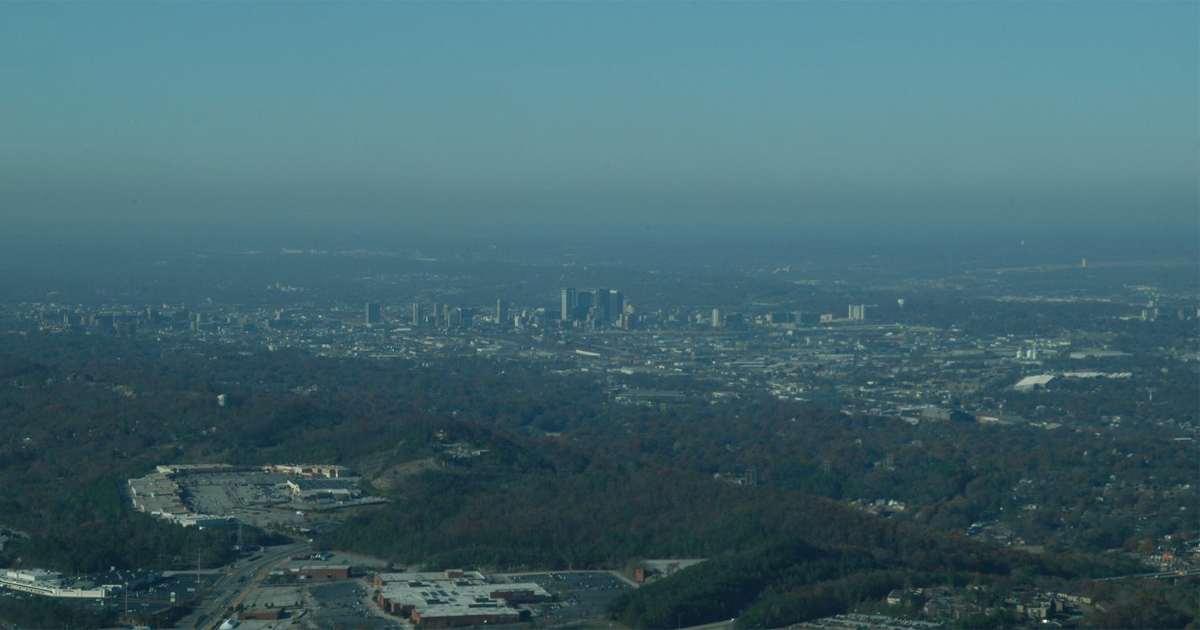What Is Ozone?
Ozone is a gas that can occur naturally or through manufactured processes. There are two types of ozone, ground-level ozone, and stratospheric ozone. Stratospheric ozone occurs in the upper atmosphere and protects the Earth from the sun’s UV rays. Ground-level ozone is a harmful pollutant that occurs in the lower atmosphere and is the main component of smog. The significant difference between the two types of ozone is that ground-level ozone has considerable dangerous effects on people and the surrounding environment (Source: Ground-level Ozone Pollution | EPA). With Birmingham being home to extensive polluting facilities like coal-fired power plants, chemical plants, and steel mills, it is a primary pollution concern.
Where Does Ground-level Ozone Come From?
Ground-level ozone cannot be directly emitted into the atmosphere and is a chemical reaction that occurs when pollutants from various machinery like cars and power plants react to sunlight (Source: Ground-level Ozone Pollution | EPA).
Is Ground-level Ozone Bad For The Environment?
Elevated ozone concentrations can have detrimental effects on various plants, including black cherries, tulip poplars, and white pines, all of which are native or commonly grown in Alabama. Ground-level ozone’s effects on plants like these include a slower rate of growth, an increased vulnerability to disease, vulnerability to insects, other pollutants, and severe weather. This damage can detrimentally affect the ecosystems in which these plants are situated(Source: Ground-level Ozone Pollution | EPA).
Is Ground-level Ozone Bad For Your Health?
Ground-level ozone can reach unhealthy levels, particularly in urban environments on hot, sunny days. Populations exceptionally vulnerable to the harmful effects of ozone include children, older people, people with asthma, and people who engage in physical activity outdoors. Symptoms of ozone exposure include coughing, sore throat, damage to airways, and aggravated lung diseases such as asthma. The severity of these symptoms can depend on a person’s level of exposure, demographic, and proximity to the source of the pollutant. Unfortunately, Birmingham communities often face higher exposure to pollutants due to factors such as proximity to industrial sites or highways, lack of green spaces, and limited access to healthcare. These factors can exacerbate health disparities and increase the vulnerability of these populations to the health effects of air pollution (Source: Ground-level Ozone Pollution | EPA).
What Are My Neighborhood’s Ozone Levels?
You can search for your area’s ozone levels through www.airnow.gov and receive alerts for Birmingham’s air quality through www.enviroflash.info (Source: Advancing Healthy Air | GASP).
What Can I Do If I Suspect Elevated Levels Of Ozone Or Other Pollutants In My Area?
If you live in Jefferson County, please report your concerns to the Jefferson County Health Department by calling 205-930-1276. If you live in Alabama but outside of Jefferson County, please submit your concern to the Alabama Department of Environmental Management through this online form. Additionally, please document your concerns to GASP’s AirWatch program through this link. (Source: Advancing Healthy Air | Gasp)



